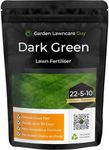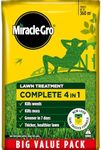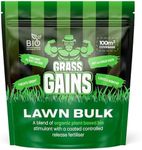Buying Guide for the Best Organic Lawn Fertilizers
Choosing the right organic lawn fertilizer is crucial for maintaining a healthy and vibrant lawn without harming the environment. Organic fertilizers are derived from natural sources and are designed to improve soil health and provide essential nutrients to your grass. When selecting an organic lawn fertilizer, it's important to consider the specific needs of your lawn, such as the type of grass, soil condition, and climate. Understanding the key specifications of organic fertilizers will help you make an informed decision that aligns with your lawn care goals.N-P-K RatioThe N-P-K ratio represents the percentage of nitrogen (N), phosphorus (P), and potassium (K) in the fertilizer. These are the primary nutrients that plants need to grow. Nitrogen promotes lush, green growth; phosphorus supports root development; and potassium enhances overall plant health. The ratio is important because it helps you understand what your lawn needs. For example, a high nitrogen ratio is ideal for promoting green growth, while a balanced ratio is better for overall health. Choose a ratio based on your lawn's current condition and growth goals.
Source of NutrientsOrganic fertilizers can be made from various natural sources such as compost, manure, bone meal, or seaweed. The source of nutrients affects how quickly they are released into the soil and how they benefit your lawn. For instance, compost and manure release nutrients slowly, providing a steady supply over time, while seaweed can offer a quick boost. Consider the nutrient source based on how quickly you want to see results and the long-term health of your soil.
Application MethodOrganic fertilizers come in different forms, such as granules, liquids, or powders, each with its own application method. Granular fertilizers are easy to spread and provide a slow release of nutrients, making them ideal for long-term feeding. Liquid fertilizers are absorbed quickly and are great for a fast nutrient boost. Powders can be mixed with water for a customized application. Choose the application method that fits your lawn care routine and the specific needs of your grass.
Soil Health BenefitsOne of the advantages of organic fertilizers is their ability to improve soil health by increasing microbial activity and enhancing soil structure. This is important because healthy soil supports robust plant growth and resilience against pests and diseases. Look for fertilizers that specifically mention soil health benefits if you are aiming to improve the overall condition of your lawn's soil.
Environmental ImpactOrganic fertilizers are generally more environmentally friendly than synthetic options, but it's still important to consider their impact. Some organic fertilizers are made from renewable resources and have minimal processing, which reduces their carbon footprint. If environmental sustainability is a priority for you, look for fertilizers that are certified organic and have a low environmental impact.

















